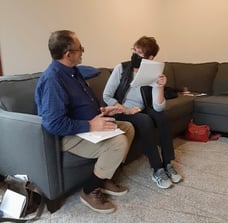I want to reassure you. If you have disagreement among your leadership team, your staff, your congregation, or your board, —you are absolutely normal. Your group is not experiencing a “widespread problem”. Your team or board or group is functioning as expected among intelligent, thinking beings. Having disagreement means that you lead people, not a group of robots.

It is helpful to draw a clear distinction between disagreements and unhealthy conflict. Canadian author Betty Pries explains that with disagreement, the differences can be substantial, but trust between the parties is strong. The parties are engaged and seek to hear and understand each other. They seek to articulate their own views without fear. Their sense of their own selfhood is strong. They know that it is possible to disagree without feeling that their very selfhood or identity is at risk.
Disagreements turn into unhealthy conflicts when the other person who believes differently becomes the problem, rather than focusing on the problem-as-the-problem. Negative thoughts can build to a point where the other party can do nothing right, no matter what. Third parties are drawn in to triangulate the situation by affirming that the other party is the problem. The disagreement turns into an unhealthy conflict and becomes entrenched.
Here are six ideas to help your team, staff, board, or congregation to experience disagreement as healthy and helpful:
- Be proactive. Invest time in building trust and respect among the members of the group. Create opportunities to enter deeply into conversation with each other with open ended questions that build connection and allow group members to know each other as people. Clarify the purpose for taking the precious time to do this. An investment in relationships and trust will pay off in the future in terms of resilience, cohesion, and shared wisdom.
- Explicitly acknowledge the areas of disagreement before they ever have a chance to become unhealthy conflict. Name the area of disagreement in a way that is acceptable to all the viewpoints. Avoid articulating the disagreement as a binary of choices. You want to allow room to generate many alternatives.
- Create practices and processes so that all group members can be heard. The Liberating Structures website has a wealth of ideas for how to do this with all size groups of people. Too often, some people dominate the discussion while others never have a chance or the courage or safety to speak. As a leader, you can create those spaces.
- Learn to listen to each other with respect. Aim to dialogue for understanding rather than a debate for winning. When we are listened to, and heard, even by people who believe differently, we feel respected.

“Being listened to is so close to being loved that most people can’t tell the difference.” (David Augsburger) - Cultivate a culture of curiosity that normalizes, welcomes, thanks, and affirms differences of thought. Disagreements should not be seen as an annoying inconvenience that slows down the process. Rather than jumping to conclusions of judgement, encourage each other to be exposed to other experiences and other ways of being, doing, thinking, and believing. The outcome will be strengthened when all points of view are welcomed.
- Focus conversations on “interests” rather than “positions”. When we take a position, we dig in our heels and believe that our response is the only acceptable option. Interests are broader than positions and describe what is needed for satisfaction or the reasons behind our way of thinking. “What really matters to me is that __________.” Looking for the interests behind the positions allows you to generate multiple acceptable options to not only move forward, but to thrive.
May you and your leadership team, congregation, staff, board, or members build the trust needed to normalize, articulate, welcome, and affirm disagreement.
If your group would appreciate some help in building trust and laying a foundation that can support and affirm differences, please connect with me.
Tags:
board officers, Organizational Management, leadership, conflict management, listening, vulnerability, leading, relationships, trust, healthy teams, thrive, teambuilding, Clarity and Curiosity Blog/Jeanne%20Zimmerly-Jantzi%20Headshot%20(300x300).png)
March 31, 2022

Comments